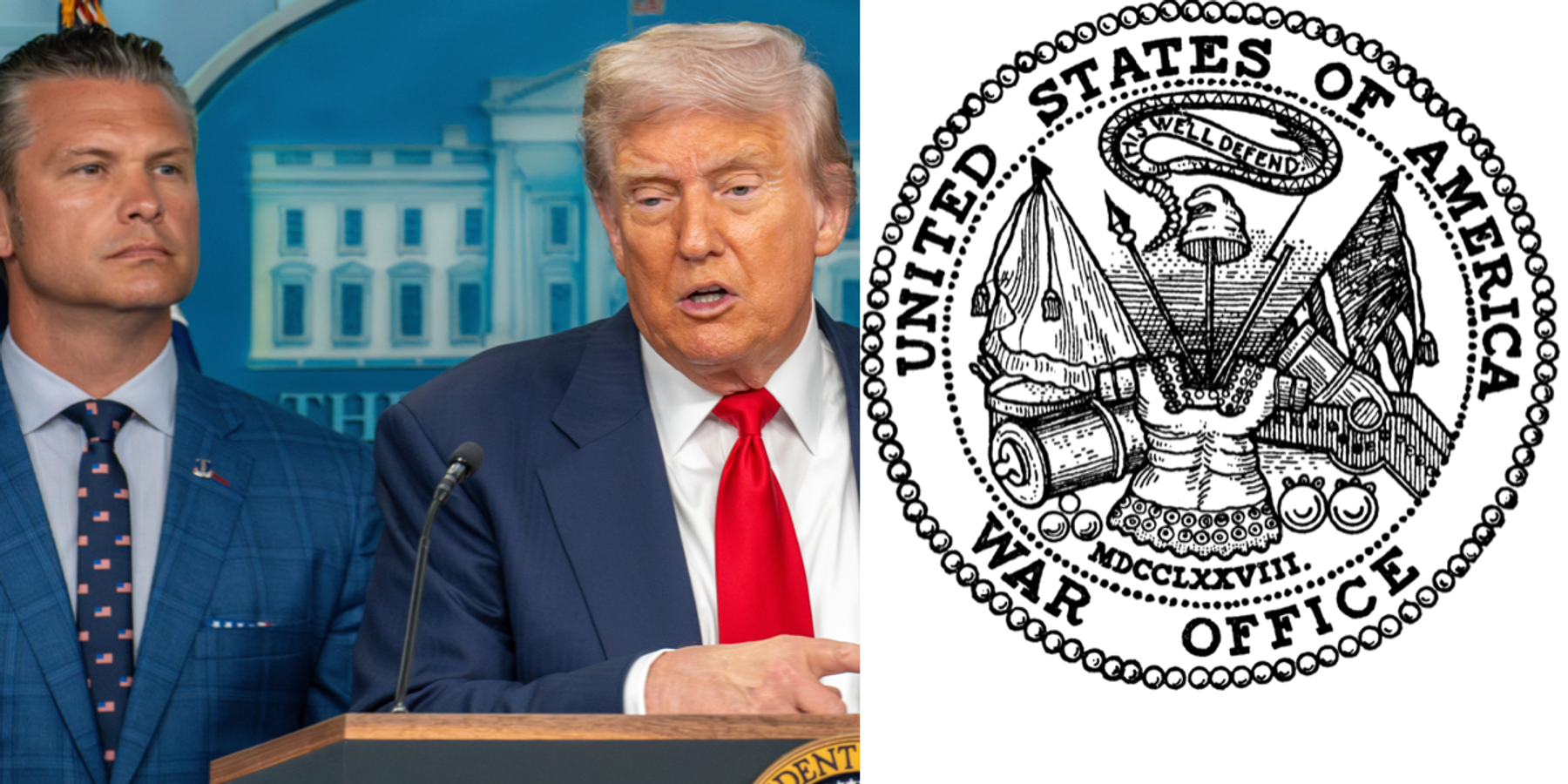There are reports that President Donald Trump will announce the change from the Department of Defense back to its old name, the Department of War, today.
(Editor's note: an executive order changing the name was publicly signed by President Trump in the White House on Friday.)
This change requires congressional approval and Republican Sen. Mike Lee (R-Utah) has already introduced a bill to change the name back to what it was before it was abandoned in 1947.
“For the first 150 years of our military’s history, Americans defeated their enemies and protected their homeland under the War Department,” Lee said in a news release Tuesday.
The War Department was established in 1789 after President George Washington signed it into law, and today includes under its banner all five branches of the U.S. military: the Army, Navy (along with the Marine Corps), Air Force, and the newest addition, the Space Force.
It also oversees 11 massive combatant commands including the most familiar and active: CENTCOM (the Middle East area of operations) and IndoPacom (the Asia Pacific).
“It used to be called the Department of War and it had a stronger sound,” Trump said in the Oval Office last week.
"We want defense, but we want offense too,” he added. “As [the] Department of War we won everything. We won everything and I think we're going to have to go back to that."
Secretary of Defense Pete Hegseth has assured Trump that the name change is “coming soon.”
On face value, many observers took Trump’s pledge to mean a more hawkish posture by this administration with some on the left and right having a negative reaction to the possible change. He also appears to associate the old name with winning, like a talisman. Unfortunately, aside from Persian Gulf I, most Americans associate World War II as the last time they associate America with “winning” a major war.
But for others, even non-interventionists and foreign policy realists, the name change is just more honest.
For example, Mr. Antiwar himself, libertarian icon Ron Paul wrote on Tuesday, “the US has been at war nearly constantly since the end of World War II, so it’s not like the ‘Defense Department’ has been in any way a defensive department.”
“With that in mind, returning the Department of Defense to the Department of War, which is how it started, may not be such a bad idea after all – as long as we can be honest about the rest of the terms around our warmaking,” Paul observed.
The former Republican congressman emphasized that the name change could refocus attention on the constitutionally legal way to go to war, adding that continuing to merely call it the “defense” department is just a “charade.”
The libertarian Institute for Justice’s Patrick Jaicomo shared, “Apparently the President and I both favor restoring the Department of Defense’s original name: THE DEPARTMENT OF WAR.”
He added, “Given how few U.S. military interventions have been defensive, it’s an honest name. And it may make Americans reconsider the department’s budget and actions.”
Breaking Points correspondent James Li noted, “Hot Take: The function of the modern U.S. military is basically to invade countries that don’t want to give us their oil and to bomb whoever Israel tells us to.”
“So yes, changing the name to the Department of War makes total sense,” Li added.
Medea Benjamin of Code Pink agrees. "I'm glad Trump is changing the name of the Defense Department to the War Dept because it has never been about defense," she Tweeted.
When reports started coming in that the change would be happening journalist and podcaster Glenn Greenwald wrote, “Far more honest.”
Others also seemed glad to finally label the “Defense” Department correctly.
Dan Caldwell. former adviser to Secretary of Defense Pete Hegseth, wrote, “FWIW: the U.S. became a much more interventionist power after the creation of the Department of Defense subsumed the Department of War (and Navy) in 1947. Renaming DoD the Department of War is just acknowledging the reality of what DoD's actual role has been the last 80 years.”
Senior Fellow at the Institute for Peace and Diplomacy Michael Vlahos seconded Caldwell, observing, “From our vantage today officially restoring the original appellation should deprive our state and military of the fig leaf that our constant use of lethal force is somehow in the righteous cause of ‘Defense.’ Now it will be plainly in the pursuit of ‘War.’
“A small truth regained!” Vlahos added.
Truth indeed. “War is the health of the state” World War I-era progressive Randolph Bourne famously wrote, and as Caldwell noted that under the Department of Defense, America became even more interventionist abroad as the U.S. government grew larger domestically, the two not necessarily being a coincidence.
Few could be mad at the notion of “defense,” which is any nation’s right. It’s an inherent positive, rhetorically. So much so that it becomes easier to deploy troops, send foreign aid or spend money at home in the name of it. To get away with pretty much anything in the name of it.
But “war?” Is that something the U.S. should get involved in? Shouldn’t Congress be included? Sounds serious.
The truth is that America has been involved in many wars for many decades that have all been portrayed as national “defense,” when they really weren’t, with a government department of the same name to reinforce those illusions.
Words have meaning and can confirm reality. The Department of Defense should be called the Department of War again, because that’s what it was, and that’s what it is.

















